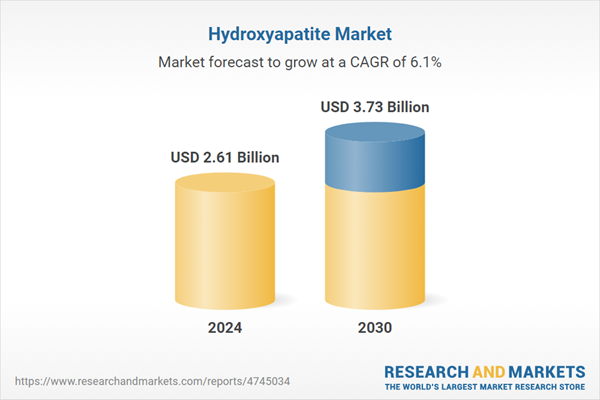Nano-Sized is the fastest growing segment, North America is the largest regional market
Speak directly to the analyst to clarify any post sales queries you may have.
10% Free customizationThis report comes with 10% free customization, enabling you to add data that meets your specific business needs.
Key Market Drivers
The rising prevalence of bone and dental disorders represents a significant catalyst for the global hydroxyapatite market, directly stimulating demand for biocompatible materials in restorative and reconstructive procedures. As populations age and lifestyle factors contribute to increased incidences of skeletal and oral health issues, the need for effective treatment solutions intensifies. Hydroxyapatite, as the primary mineral component of natural bone and teeth, is critical in applications such as bone grafts, dental implants, and enamel repair, offering excellent osseointegration and biocompatibility.The urgency for these interventions is underscored by the substantial burden of these conditions. According to the International Osteoporosis Foundation, in October 2024, "On World Osteoporosis Day, experts warn of growing burden of fragility fractures" reported that up to 37 million fragility fractures occur annually worldwide in individuals aged over 55. This high incidence drives the continuous demand for advanced biomaterials capable of facilitating bone regeneration and structural support.
Key Market Challenges
The high production cost associated with manufacturing high-purity, medical-grade hydroxyapatite, particularly its nano-sized variants, presents a significant impediment to market expansion. This directly hampers the growth of the Global Hydroxyapatite Market by affecting its overall affordability and accessibility across diverse market segments. Achieving the stringent purity levels and specific structural characteristics required for medical and dental applications, especially for nano-scale hydroxyapatite, necessitates complex manufacturing processes, specialized equipment, and rigorous quality control. These factors collectively drive up unit production costs, making final products less competitive compared to conventional or alternative materials.Key Market Trends
The global hydroxyapatite market is significantly influenced by the continuous advancements in nano-hydroxyapatite technology. These innovations focus on enhancing the material's inherent properties, leading to superior performance in various applications. Nano-hydroxyapatite, with its increased surface area and reactivity due to its nanoscale structure, facilitates improved integration with biological systems and other matrices. For instance, according to an NIH 2023 report, experimental work demonstrated up to a 30% increase in bone formation on implant surfaces when utilizing nano-hydroxyapatite, indicating substantial progress in osseointegration capabilities. This material refinement allows for more effective drug delivery systems and advanced bone tissue engineering solutions, expanding its utility beyond traditional forms into more sophisticated medical and dental devices.Key Market Players Profiled:
- Sofsera Corporation
- Taihei Chemical Industrial Co. Ltd
- Cam Bioceramics BV
- APS Materials Inc.
- Granulab (M) Sdn Bhd
- Berkeley Advanced Biomaterials Inc.
- Zimmer Biomet Holdings Inc
- CG Bio Inc.
- Bio-Rad Laboratories Inc.
- Fluidinova S.A.
Report Scope:
In this report, the Global Hydroxyapatite Market has been segmented into the following categories:By Type:
- Nano-Sized
- Micro-Sized
- Greater than Micrometer
By Application:
- Orthopedic
- Plastic Surgery
- Dental Care
- Others
By Region:
- North America
- Europe
- Asia-Pacific
- South America
- Middle East & Africa
Competitive Landscape
Company Profiles: Detailed analysis of the major companies present in the Global Hydroxyapatite Market.Available Customizations:
With the given market data, the publisher offers customizations according to a company's specific needs. The following customization options are available for the report.Company Information
- Detailed analysis and profiling of additional market players (up to five).
This product will be delivered within 1-3 business days.
Table of Contents
Companies Mentioned
The companies profiled in this Hydroxyapatite market report include:- Sofsera Corporation
- Taihei Chemical Industrial Co. Ltd
- Cam Bioceramics BV
- APS Materials Inc.
- Granulab (M) Sdn Bhd
- Berkeley Advanced Biomaterials Inc.
- Zimmer Biomet Holdings Inc
- CG Bio Inc.
- Bio-Rad Laboratories Inc.
- Fluidinova S.A.
Table Information
| Report Attribute | Details |
|---|---|
| No. of Pages | 180 |
| Published | November 2025 |
| Forecast Period | 2024 - 2030 |
| Estimated Market Value ( USD | $ 2.61 Billion |
| Forecasted Market Value ( USD | $ 3.73 Billion |
| Compound Annual Growth Rate | 6.1% |
| Regions Covered | Global |
| No. of Companies Mentioned | 11 |









